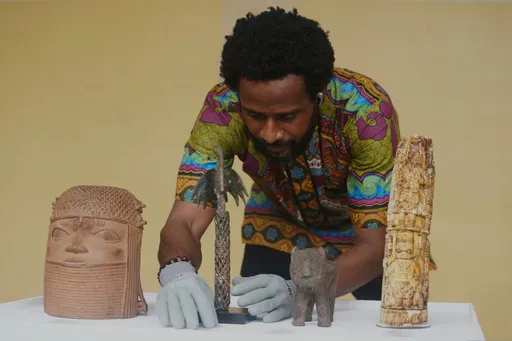Thabo Mokoena walks through his potato field in the mountainous Matebeng region of Lesotho, carefully checking the plants for any sign of disease or stunted growth.
The crop looks good this year, a stark contrast to seasons past when his small plot would barely yield enough to survive.
For years, Mokoena gambled each planting season against erratic rains and poor soil. A few rows of maize, some vegetables. Enough to get by, but never enough to thrive.
A short walk away, his neighbour Malerato Ntai faced the same struggles, watching her hopes for reliable income disappear with each drought or early frost.
This season is different. Healthy potato plants now cover the terraced slopes, and Mokoena allows himself a rare smile.
"Before, the land was tired, and so was I," he tells TRT Afrika. "Now, these potatoes are not just food; they are our future. For the first time, I see a path for my children that doesn't end with leaving for the city."
Bolstering food security
Mokoena and Ntai are among hundreds of Basotho farmers benefiting from a government programme that is being implemented in collaboration with the United Nations Food and Agriculture Organisation (FAO) to boost the potato value chain.
In partnership with the Potato Lesotho Association, the programme aims to improve food security and rural incomes while building climate resilience.
Designated as a flagship commodity under the global One Country One Priority Product (OCOP) initiative, the ubiquitous potato has emerged as a strategic answer to these challenges.
Agriculture remains a primary livelihood in Lesotho, but climate-related shocks and the lingering socioeconomic impact of the pandemic have severely undermined it.
"The potato was prioritised precisely because of its resilience and nutritional value," explains Dr Karaba Dlamini, an agronomist based in Lesotho's capital Maseru.
"Potatoes grow well in cooler climates, have a shorter growing season than many traditional crops, and provide excellent nutritional output per hectare. In a country facing food insecurity and requiring dietary diversification, it's a game-changer."
Dr Dlamini believes the programme isn't just about growing potatoes; it creates opportunities and protects communities from the climate shocks that have affected their livelihoods.
Seeding knowledge
The transformation that farmers like Mokoena and Ntai have experienced didn't happen by chance.
A core part of the initiative invests directly in farmers through a partnership backed by World Bank funding. Participants received certified seeds, fertilisers, and hands-on training in improved agronomic practices and climate-smart techniques.
"For us women, the knowledge we received was the real seed of change," Ntai tells TRT Afrika, pointing to the lush green crops covering terraced slopes.
"They taught us how to conserve water, how to space our plants, and read the soil. This isn't just about planting crops; it's structured farming."

Knowledge-sharing through field demonstrations and targeted technical support has also helped in other ways.
Exploratory work on potato tissue culture is laying the groundwork for sustainable seed production, reducing dependence on expensive imports and building self-sufficiency from the ground up.
Production at scale
Available data confirms how the programme has delivered significant gains across the potato value chain.
The area under potato cultivation in the project has increased by 146%, while farmers have reported an increase in yields by up to 42%.
National production more than trebled in a single cropping season since the project's launch, reflecting both farmer participation and the effectiveness of the support mechanism.
More potatoes mean lower prices and better availability. Households are consuming more, which in turn supports healthier, more diverse diets and strengthens food security in rural communities.
"Look at this," says Mokoena, gesturing towards his field. "This is what hope looks like."





























